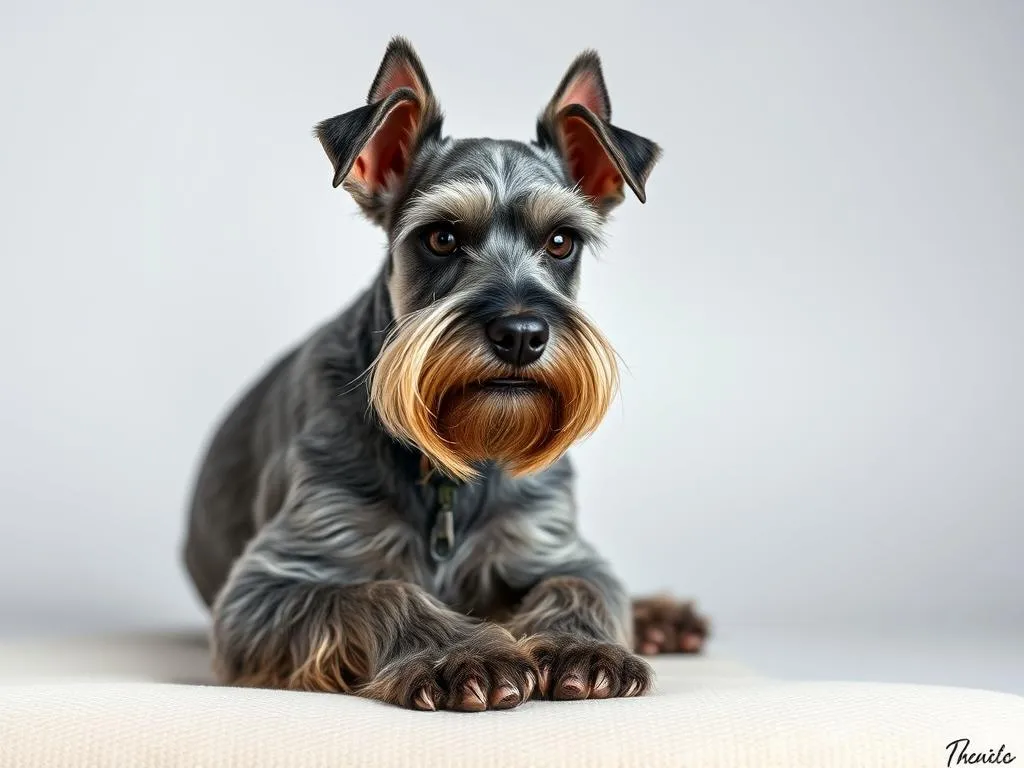
Introduction
The Miniature Schnauzer is a beloved breed known for its distinctive appearance and lively personality. This small dog, with its charming beard and eyebrows, captures the hearts of many dog lovers around the globe. Before deciding to adopt a Miniature Schnauzer, it’s essential to understand both the pros and cons of owning one. This balanced view will help potential dog owners make an informed decision about whether this breed is the right fit for their lifestyle.
History and Background of the Miniature Schnauzer
The origins of the Miniature Schnauzer date back to Germany in the late 19th century. Breeders sought to create a small, efficient ratting dog by crossing the Standard Schnauzer with smaller breeds such as the Affenpinscher and the Poodle. The breed was primarily developed for farm work, keeping barns free of rodents while also serving as a loyal companion to their human families.
The Miniature Schnauzer was officially recognized by the American Kennel Club (AKC) in 1926, and it has since gained popularity. Ranked among the top 20 breeds in the United States, the Miniature Schnauzer has become a favorite for families and individuals alike.
Physical Characteristics of the Miniature Schnauzer
The Miniature Schnauzer is compact, sturdy, and offers a unique blend of strength and agility.
Size and Weight
Typically, these dogs stand about 12 to 14 inches tall at the shoulder and weigh between 11 to 20 pounds. Their small size makes them ideal for various living situations, from apartments to larger homes.
Coat and Grooming Needs
The breed is known for its wiry coat, which can come in various colors, including salt-and-pepper, black, and white. Their grooming needs are significant, as they require regular brushing to prevent matting and professional grooming every 4 to 6 weeks to maintain their distinctive look.
Distinctive Features
One of the most recognizable features of the Miniature Schnauzer is its bushy beard and expressive eyebrows, giving them a distinct and charming appearance. They have a robust build and a lively gait that reflects their energetic nature.
Temperament and Behavior
The temperament of a Miniature Schnauzer can be described as intelligent, affectionate, and spirited.
General Temperament Traits
These dogs are known for their intelligence and eagerness to please, making them relatively easy to train. They thrive on human interaction and are typically very loyal to their families.
Common Behavioral Characteristics
Miniature Schnauzers are alert and protective, often serving as excellent watchdogs. Their playful nature means they enjoy engaging in activities and games with their families, and they have moderate energy levels that require regular exercise.
Socialization Needs
Early socialization is crucial for Miniature Schnauzers, as it helps them learn how to interact appropriately with children and other pets. A well-socialized Miniature Schnauzer is generally friendly and outgoing, while a poorly socialized one may exhibit anxiety or aggression.
Pros of Owning a Miniature Schnauzer
Companionship
One of the primary pros of owning a Miniature Schnauzer is the companionship they provide. These dogs are incredibly loyal and tend to form strong bonds with their owners. They adapt well to various living environments, whether in an apartment or a house with a yard.
Health
Miniature Schnauzers are generally healthy dogs with a lifespan of 12 to 15 years. They have a lower incidence of certain hereditary diseases compared to other breeds, making them a good choice for families looking for a long-term companion.
Intelligence and Trainability
This breed is known for its intelligence and willingness to learn. Miniature Schnauzers excel in obedience training and can also participate in agility competitions. Their desire to please their owners makes them highly trainable.
Low Shedding
With their wiry coats, Miniature Schnauzers are considered hypoallergenic. This quality makes them an excellent choice for allergy sufferers, as they shed less dander than many other breeds.
Versatility
Miniature Schnauzers are versatile dogs that can fit into various lifestyles. Whether you lead an active life or prefer a more laid-back routine, these dogs can adapt and thrive. They enjoy participating in dog sports and activities, making them excellent companions for both active individuals and families.
Cons of Owning a Miniature Schnauzer
Grooming Requirements
Despite their appealing appearance, the grooming needs of a Miniature Schnauzer can be a drawback. Regular grooming is necessary to maintain their coat, and the costs associated with professional grooming can add up over time. Owners should be prepared to invest time and money into their grooming routine.
High Energy Levels
While Miniature Schnauzers are energetic and playful, they require daily exercise and mental stimulation. Without sufficient activity, they may develop behavioral issues, such as excessive barking or destructive behavior. Potential owners should be committed to providing the necessary exercise for their dog.
Barking Tendencies
Miniature Schnauzers have a natural instinct to bark, making them excellent watchdogs. However, this trait can become problematic if not managed properly, especially in apartment living situations where noise complaints may arise. Training can help mitigate excessive barking, but it requires consistency and patience.
Health Concerns
While generally healthy, Miniature Schnauzers are susceptible to specific health issues, including pancreatitis and cataracts. Regular veterinary check-ups are vital to monitor their health and catch any potential problems early.
Separation Anxiety
Miniature Schnauzers can form strong attachments to their owners, leading to potential separation anxiety. This issue can manifest in destructive behaviors when left alone for extended periods. Strategies to mitigate this anxiety include crate training and providing engaging toys to keep them occupied.
Ideal Living Conditions for a Miniature Schnauzer
Miniature Schnauzers are adaptable but thrive best in a dog-friendly environment.
Space Requirements
These dogs can comfortably live in both apartments and houses, provided they receive enough exercise. It’s crucial to factor in their exercise needs when considering living space.
Importance of a Dog-Friendly Environment
A dog-friendly environment is essential for a Miniature Schnauzer. Secure yards and nearby parks for walks and playtime will enhance their quality of life.
Recommendations for Families, Singles, and Seniors
Miniature Schnauzers make excellent companions for families, singles, and seniors alike. They are affectionate and enjoy being part of family activities, making them a suitable choice for households with children. Singles looking for a loyal companion or seniors seeking a smaller dog will find the Miniature Schnauzer to be a delightful addition to their lives.
Conclusion
In summary, the Miniature Schnauzer offers an array of benefits, including companionship, adaptability, and intelligence. However, potential owners should also consider the grooming demands, exercise needs, and behavioral tendencies associated with this breed. Ultimately, the ideal owner for a Miniature Schnauzer will be someone who values companionship and is willing to invest time in grooming, training, and exercise. Understanding both the pros and cons will lead to a rewarding relationship with this charming breed.
FAQs
What is the average lifespan of a Miniature Schnauzer?
The average lifespan of a Miniature Schnauzer is between 12 to 15 years, depending on their overall health and care.
How do they interact with other pets?
Miniature Schnauzers can get along well with other pets, especially when socialized from a young age. However, their terrier instincts may lead them to chase smaller animals.
What is the cost of owning a Miniature Schnauzer?
The cost of owning a Miniature Schnauzer includes initial expenses such as adoption fees, vaccinations, and grooming. Additionally, consider ongoing costs like food, vet visits, and training classes. Overall, prospective owners should budget accordingly to ensure they can provide the best care for their new furry friend.









